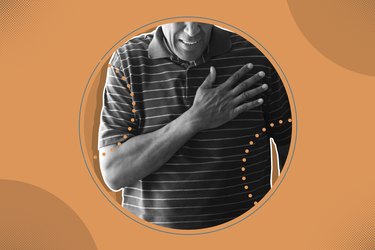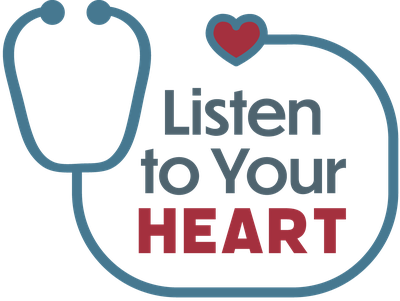
If you think of your body as a complex machine, your heart is the motor that keeps it all going. So when you have a heart attack, it's no wonder that your brain and other organs can be affected along with your ticker.
In the simplest terms, a heart attack happens when blood flow to the heart is blocked. But there's a lot more to it than that.
Video of the Day
Understanding exactly what's going on in your body during this cardiac event can help you recognize the signs of a heart attack that much faster. And that's crucial, because the sooner you get help, the lower your odds of having lasting damage, according to the Mayo Clinic.
Here's a look at the full-body effects of a heart attack.
At Least One of Your Arteries Becomes Blocked by Plaque
A network of blood vessels known as coronary arteries surrounds your heart and supplies it with oxygen and nutrient-rich blood, which it needs to function. Over time, though, cholesterol and other substances — including fat, cellular waste, calcium and blood clotting material — can build up in these vessels and start to get in the way of blood flow, per the Mayo Clinic. This is called plaque.
Over time, as the plaque increases, the outside becomes hard due to calcium buildup, says Nicholas Ruthmann, MD, a cardiologist at the Cleveland Clinic.
"Your body recognizes this as an injury to itself, and your heart sends all sorts of different chemicals, proteins and clotting factors to the artery to try to fix the plaque formed there," Dr. Ruthmann says.
This causes a blood clot to form around the plaque, which, combined with artery inflammation, can cause a blockage.
At first, it's often just a partial blockage, which means some oxygen and nutrients can get through, says Nihar Desai, MD, associate professor of medicine at the Yale School of Medicine. But over time, if it's undiagnosed and untreated, it can continue to build up and get worse, until that artery becomes completely blocked — that's what triggers a heart attack.
What It Might Feel Like
A partially or fully blocked artery delivers less oxygen to your heart, which in turn can't pump as well. This can cause you to feel tired and short of breath — two common heart attack symptoms.
Your Heart Tissue Starts to Die
When an artery to the heart is completely blocked, the part of the heart muscle that has lost blood supply (and thus oxygen) becomes injured.
"Heart cells and heart tissue aren't able to survive too long without oxygen and blood flow, so if that blockage isn't opened up quickly, you'll experience damage," Dr. Desai says.
The amount of damage to the heart muscle depends on the size of the area supplied by the blocked artery, he adds, along with the amount of time between injury and treatment.
That's why early treatment is so important, he says. If symptoms persist for more than 15 minutes, there's a higher risk that heart tissue will die. You only have about 90 minutes from the start of your heart attack before critical heart tissue dies or experiences irreversible damage, according to the Society for Cardiovascular Angiography.
Heart muscle damaged by a heart attack heals by forming scar tissue. This usually takes about eight weeks. But because that scar tissue doesn't contract or pump as well as healthy tissue, your heart may not be able to pump as much blood as usual.
As a result, you may experience symptoms like arrhythmia (an abnormal heartbeat), because those damaged muscles disrupt electrical signals that control the heart. It can also lead to heart failure, according to the Mayo Clinic.
What It Might Feel Like
One of the “classic” heart attack symptoms is chest pain or discomfort, Dr. Desai says. This can involve pain, pressure or a squeezing sensation in the center of your chest that either lasts more than a few minutes or goes away and returns.
But people assigned female at birth are slightly more likely than those assigned male at birth to report unusual symptoms, he adds, such as:
- Upper back or shoulder pain
- Jaw pain or pain spreading to the jaw
- Pain that spreads to the arm
The symptoms above are known as referred pain, or pain felt at a site distant from the source of origin, which has to do with the way our brains are wired.
Your Brain Starts to Suffocate
A blocked artery doesn't just cut off blood to the heart. It can block oxygen-rich blood from reaching the brain, too, which causes brain cells to die.
If this goes on for more than a few minutes, it can cause a permanent brain injury. A February 2015 Circulation study found that half of all heart attack survivors experience memory loss, attention problems and other cognitive issues. (The study researchers think this is because the hippocampus — the part of the brain that helps you learn and form new memories — is extremely sensitive to lack of oxygen.)
After a heart attack, this can manifest as having difficulty using words (not remembering the right word, or using one out of context), trouble with executive functioning skills like reasoning and processing information, and also trouble processing visual information, Dr. Ruthmann says. This may also contribute to the depression many people experience while recovering from a heart attack, he adds.
What It Might Feel Like
Lack of good blood flow to the brain can cause you to feel lightheaded, according to Michigan Medicine.
Fluid May Build Up in Your Lungs
When your heart is damaged, it can't pump blood as well from your lungs to the rest of your body. This can cause blood to back up, raising pressure in the veins inside your lungs, Dr. Desai says.
This in turn can push fluid into the air sacs in your lungs, which, as it builds up, makes it harder and harder for you to breathe (a condition known as pulmonary edema).
Treatment is usually supplemental oxygen, as well as diuretics to help remove excess fluid from the lungs.
What It Might Feel Like
As you might imagine, fluid buildup in the lungs can make you feel short of breath.
Your Kidneys Can't Do Their Job
If your heart is weakened, it may not be able to pump enough oxygen-rich blood to your kidneys, which means they can't filter out all your body's water and waste. This can lead to swelling in your ankles, feet and legs, Dr. Ruthmann says.
What It Might Feel Like
Signs of fluid buildup include shortness of breath (especially at night), a wheezing cough, chronic fatigue, leg or abdominal swelling and weight gain, Dr. Ruthmann says.
What to Do if You Think You're Having a Heart Attack
If you recognize any of these signs of a heart attack, your first step should be to call 911, or, if you don't have access to emergency medical services, have someone drive you to the nearest hospital, Dr. Ruthmann says. (Don't try to drive yourself unless it's your only option, as it can put you and others in danger if your symptoms get worse.)
He also recommends that you chew a regular-strength (325-milligram) aspirin.
"Aspirin can help dissolve the blood clot," he explains. "You need to chew it, which gets it into your system faster."
Read more from our 'What Really Happens to Your Body When' series.
How to Prevent a Heart Attack
Dr. Desai says there are four key ways to help prevent plaque from building up in your arteries in the first place:
1. Stop Smoking
Smoking raises your risk of a heart attack by causing your blood to thicken (so it's more likely to clot) and damaging your blood vessel walls, according to the CDC.
The good news is, if you quit smoking today, you'll see results quickly. Your risk of a heart attack drops dramatically in the first year, and within five years, your risk of having a stroke is the same as someone who has never smoked.
2. Stay at (or Get to) a Healthy Weight
Excess weight and an extra-large waist size both contribute to heart attack risk, Dr. Desai says. If you have overweight, your risk of all sorts of heart disease, including a heart attack, is about 67 percent greater than someone at a healthy weight, according to an April 2018 study in JAMA Cardiology.
Aim for a BMI of less than 25 and a waist circumference less than 35 inches.
Ready to Lose Weight?
Set yourself up for success with LIVESTRONG.com's Weight-Loss Kickstart program.
3. Try to Be Active as Much as Possible
The more fit you are, the lower your risk of having a heart attack, according to a May 2019 study in the European Heart Journal. When researchers analyzed the fitness levels of more than 4,500 people, they found that the top 25 percent of the most fit individuals had only half as high a risk of heart attack as the least fit 25 percent.
The Physical Activity Guidelines for Americans recommend adults get at least 150 minutes of moderate-intensity activity (think: walking, biking) or 75 minutes of vigorous activity per week, and they also suggest strength training at least twice each week.
If you're not there quite yet, don't get discouraged — even a little exercise in your day is better than none (cleaning counts!). And by adding just a few minutes here and there, you can slowly but surely build up to the recommended amount.
4. Eat Like You're in Greece
Research has linked the Mediterranean diet — which is chock-full of olive oil, nuts, vegetables, fruits and lean protein like fish and poultry — to healthier hearts.
In a June 2018 study in the The New England Journal of Medicine, for example, those who followed the diet experienced 30 percent fewer heart-related events (like heart attacks or strokes) than people who followed a low-fat diet.
- American Heart Association: "Facts About Heart Disease in Women"
- Society for Cardiovascular Angiography: "Heart Attack and Conditions That Mimic Heart Attack: Learn About Chest Pain"
- Circulation: "Sex Differences in the Presentation and Perception of Symptoms Among Young Patients With Myocardial Infarction"
- American Heart Association: "Treatment of a Heart Attack"
- Circulation: "Myocardial Scar Is Prevalent and Associated With Subclinical Myocardial Dysfunction in Women With Suspected Ischemia But No Obstructive Coronary Artery Disease: From the Women's Ischemia Syndrome Evaluation-Coronary Vascular Dysfunction Study"
- JAMA Cardiology: "Association of Body Mass Index With Lifetime Risk of Cardiovascular Disease and Compression of Morbidity"
- European Heart Journal: "Peak oxygen uptake and incident coronary heart disease in a healthy population: the HUNT Fitness Study"
- The New England Journal of Medicine: "Primary Prevention of Cardiovascular Disease with a Mediterranean Diet Supplemented with Extra-Virgin Olive Oil or Nuts"
- Centers for Disease Control and Prevention: "Women and Smoking"
- Mayo Clinic: "Heart Attack"
- Journal of Applied Oral Science: "Referred Pain"
- Michigan Medicine: "Heart Rhythm Problems: Symptoms"
- U.S. Department of Health and Human Services: "Physical Activity Guidelines for Americans: 2nd Edition"
Is this an emergency? If you are experiencing serious medical symptoms, please see the National Library of Medicine’s list of signs you need emergency medical attention or call 911.
